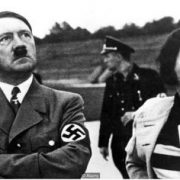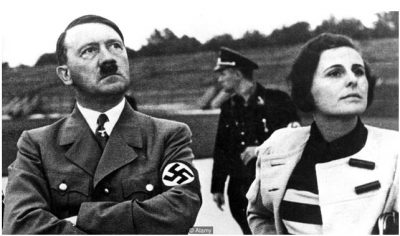My Date With Hitler's Girlfriend
With the shocking re-emergence of Nazis on America's political scene, memories are flooding back to me of some of the most amazing experiences in my life.
I have been warning my long-term readers for years now that this story was coming. The right time is now here to write it.
I know the Nazis well.
During the civil rights movement of the 1960s, I frequently hitchhiked through the Deep South to learn what was happening.
It was not usual for me to catch a nighttime ride with a neo-Nazi on his way to a cross burning at a nearby Ku Klux Klan meeting, always with an uneducated blue-collar worker.
In fact, being a card-carrying white kid, I was often invited to come along.
I had a stock answer: "No thanks, I'm going to another Klan meeting further down the road."
That opened my driver up to expound at length on his movement's philosophy.
What I heard was chilling.
During 1968 and 1969, I worked in West Berlin at the Sarotti Chocolate factory in order to perfect my German. On the first day at work, they let you eat all you want for free. After that, you get so sick that you never wanted to touch the stuff again. Some 50 years later and I still can’t eat their chocolate.
Answering an ad, I found myself living with a Nazi family near the company's Tempelhof factory.
There was one thing about Nazis during the 60s: They loved Americans.
After all, it was we who saved them from certain annihilation by the teeming Bolshevik hoards from the east.
The American postwar occupation, while unpopular, was gentle by comparison. It turned out that everyone loved Hershey bars.
As a result, I got free room and board for two summers at the expense of having to listen to some very bizarre theories about race. I remember the hot homemade apple strudel like it was yesterday.
Let me tell you another thing about Nazis. Once a Nazi, always a Nazi. Just because they lost the war didn't mean they dropped their extreme beliefs.
Fast-forward 30 years, and I was a wealthy hedge fund manager with money to burn, looking for adventure with a history bent during the 1990s.
I was mountain climbing in the Bavarian Alps with a friend, not far from Garmisch-Partenkirchen, when I learned that Leni Riefenstahl lived nearby, then in her 90s.
Attending the USC film school with a young kid named Steven Spielberg decades earlier, I knew that Riefenstahl was a legend in the filmmaking community.
She produced such icons as Olympia, about the 1932 Berlin Olympics, and The Triumph of the Will, about the Nuremburg Nazi rallies. It is said that Donald Trump borrowed many of these techniques during his successful 2016 presidential run.
It was rumored that Riefenstahl was also the onetime girlfriend of Adolph Hitler.
I needed a ruse to meet her since surviving members of the Third Reich tend to be very private people, so I tracked down one of her black and white photos of Nubian warriors, which she took during her rehabilitation period in the 1960s.
It was my goal to get her to sign it.
Some well-placed intermediaries managed to pull off a meeting with the notoriously reclusive Riefenstahl, and I managed to score a half-hour tea.
I presented the African photograph and she seemed grateful that I was interested in her work. She signed it quickly with a flourish.
I then gently grilled her on what it was like to live in Germany in the 1930s. What I learned was fascinating.
But when I asked about her relationship with The Fuhrer, she flashed, "That is nothing but Zionist propaganda."
Spoken like a true Nazi.
The meeting was at an end.
I took my signed photograph home, framed it, hung it on my office wall for a few years. Then I donated it to a silent auction at my kids' high school.
Nobody bid on it.
The photo ended up in storage at my home, and when it was time to make space, it went to Goodwill.
I obtained a nice high appraisal for the work of art and then took a generous tax deduction for the donation, of course.
It is now more than a half-century since my first contact with the Nazis.
By the way, the torchlight parade we saw in Charlottesville, VA was obviously lifted from The Triumph of the Will, except that they didn't use tiki poolside torches in Germany in the 1930s.
Riefenstahl and Friend Before




